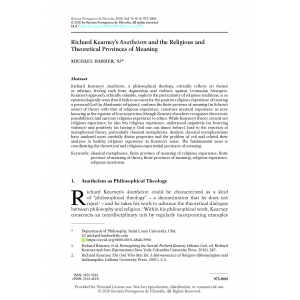Alston, William. Perceiving God: The Epistemology of Religious Experience. Ithaca and London: Cornell University Press, 1991.
Barber, Michael. Religion and Humor as Emancipating Provinces of Meaning. Dordrecht: Springer, 2017.
Dreyfus, Georges. “Is Mindfulness Present-Centred and Non-Judgmental? A Discussion of the Cognitive Dimensions of Mindfulness.” In Mindfulness: Diverse Perspectives on Its Meaning, Origins, and Multiple Applications at the Intersection of Science and Dharma, edited by J. Mark G. Williams and Jon Kabat-Zinn. Contemporary Buddhism 12 (201l): 42-50.
Heidegger, Martin. Identity and Difference. Translated by Joan Stambaugh. New York: Harper and Row Publishers, 1969.
Husserl, Edmund. Cartesian Meditations: An Introduction to Phenomenology. Translated by Dorion Cairns. The Hague: Martinus Nijhoff, 1960.
Kearney, Richard. Anatheism: Returning to God After God. New York: Columbia University Press, 2010.
Kearney, Richard. The God Who May Be: A Hermeneutics of Religion. Bloomington and Indianapolis: Indiana University Press, 2001.
Kearney, Richard. On Stories. London and New York: Routledge, 2002.
Kearney, Richard. “Paul’s Notion of Dunamis: Between the Possible and the Impossible.” In St. Paul Among the Philosophers, edited by John Caputo and Linda Alcoff, 142-159. Indianapolis: Indiana University Press, 2009.
Kearney, Richard. Strangers, Gods, and Monsters: Interpreting Otherness. London and New York: Routledge, 2003.
Kearney, Richard. “The Wager of Carnal Hermeneutics.” In Carnal Hermeneutics, edited by Richard Kearney and Brian Treanor, 15-56. New York: Fordham University Press, 2015.
Kearney, Richard. with James Wood, Catherine Keller, Charles Tayor, Julia Kristeva, Gianni Vattimo, Simon Critchley, Jean-Luc Marion, John Caputo, David Tracey, Jens Zimmerman, and Merold Westphal, edited by Richard Kearney and Jens Zimmerman. Reimagining the Sacred: Richard Kearney Debates God. New York: Columbia University Press, 2016.
Levinas, Emmanuel. Otherwise than Being, or Beyond Essence. Translated by Alphonso Lingis. Pittsburgh: Duquesne University Press, 1998.
Levinas, Emmanuel. Totality and Infinity: An Essay on Exteriority. Translated by Alphonso Lingis. The Hague: Martinus Nijhoff, 1979.
Marion, Jean-Luc. God without Being: Hors-Texte, Second Edition, Forward by David Tracy. Translated by Thomas A. Carlson. Chicago and London: The University of Chicago Press, 2012.
Merton, Thomas. Day of the Stranger. Salt Lake City: Gibbs M. Smith, Inc., 1981.
Merton, Thomas. Echoing Silence: On the Vocation of Writing. Boston and London: New Sees, 2007.
Merton, Thomas. The Springs of Contemplation: A Retreat at the Abbey of Gethsemani. Edited by Jane Marie Richardson. New York: Farrar, Straus, Giroux, 1992.
Merton, Thomas. Zen and the Birds of Appetite. Gethsemani, Kentucky: The Abbey of Gethsemani, Inc., 1968.
Scheler, Max. On the Eternal in Man. Translated by Bernhard Noble. New Brunswick and London: Transaction Publishers, 2010.
Schutz, Alfred. “On Multiple Realities.” In Collected Papers 1: The Problem of Social Reality, edited by Maurice Natanson, 207-259. The Hague: Martinus Nijhoff, 1962.
Steinbock, Anthony. Phenomenology and Mysticism: The Verticality of Religious Experience Bloomington and Indianapolis: Indiana University Press, 2009.
Stump, Eleonore. The God of the Bible and the God of the Philosophers (Milwaukee: Marquette University Press, 2016.
Suzuki, Daisetz T. and Thomas Merton.“Wisdom of Emptiness,” in Zen and the Birds of Appetite, 99-138. Gethsemani, Kentucky: The Abbey of Gethsemani, Inc. 1968.
Van Inwagen, Peter. “The Problem of Evil, the Problem of Air, and the Problem of Silence.” In The Evidential Argument from Evil, edited by Daniel Howard-Snyder, 161-187. Bloomington and Indianapolis: Indiana University Press, 1996.










